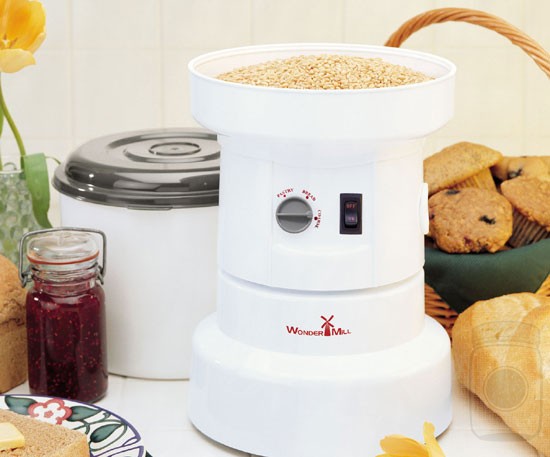Table of Contents[Hide][Show]
 Many readers have emailed me over recent weeks with questions regarding the grain grinding routine in my kitchen. I realized that I needed to take a step back and show you the basics of selecting a grain grinder and other tasks related to making fresh flour to help you determine a routine that works best for you.
Many readers have emailed me over recent weeks with questions regarding the grain grinding routine in my kitchen. I realized that I needed to take a step back and show you the basics of selecting a grain grinder and other tasks related to making fresh flour to help you determine a routine that works best for you.
Remember that starting to grind fresh grain in your home should only be started after you have started cooking with the right fats! Getting the fats right is the most important change you can make in your kitchen.
Using fresh flour is a wonderful addition to your cooking repertoire as even the organic flours from the healthfood store or the ones shipped to your door are nutritionless and not worth the money. Once you grind flour, the nutrition is gone in about 3 days in an unrefrigerated situation. Freezing your flour right after grinding will preserve this nutrition for weeks, which is why you really need to do it yourself. As you can see from the video, flour can be used immediately right out of the freezer, so there is no disadvantage to freezing it.
Grain Requires Proper Preparation after Grinding
Delving into Traditional Eating for the first time inevitably uncovers the fact that modern methods for preparing grains and legumes can be extremely damaging to health over the long term particularly if numerous servings of these foods are consumed on a daily basis as recommended by conventional dieticians and nutritionists.
Even if you take the time and care to make your own bread at home with freshly ground grain, if you do not follow the centuries old traditions for eliminating anti-nutrients and maximizing the nutrition in the grain prior to baking, you could in fact be doing yourself and your family more harm than good. These methods are sour leavening, soaking, and/or sprouting.
But first, you must grind the grain! Below is the video how-to.
Grain Grinding Basics
Sarah, The Healthy Home Economist








One of the methods to properly prepare grains can involve soaking the flour – not the wheat berries. You can also SPROUT the wheat berries and then dry them before grinding into sprouted flour (this is another method). But if you are using the soaking method, you don't soak the berries – you soak the flour.
i thought you "prepared" your grains by soaking them before you ground them. do you use the flour without preparing it any further.
You can still ‘prepare’ the grains after they’re ground by soaking the flour. Problem is, you can’t drain the soak water and rinse, but the phytic acid can be neutralized by seaweed. Kombu holds up real well, so if you soak your batter with seaweed in it, or seaweed soak/cook water, it neutralizes the acids. This is improved even more by fermenting, in the case of sourdough bread.
The other option, is to soak (you can sprout too) and then dehydrate, and THEN grind. This is probably the best option.
i thought you always "prepared" your grains before you ate them. i presumed you soaked then dried them before grinding.
I had an email today from someone asking for a reference on the 3 days and flour is nutritionless when unrefrigerated comment I made in the blog. I have read this in a number of places over the years, here is one ref:
Another is Nourishing Traditions cookbook which states that grains quickly go rancid after grinding which is why home grinding is a must.
Not exactly sure how many cups of grain equals cups of flour as I grind large amounts at once and don't grind for a specific recipe typically. I think I heard once that it is nearly a 1:1 or a 1:1.5 ratio. I have never noticed a difference between sprouted and unsprouted flour – I substitute 1:1. Same with using fresh flour – I don't use any more or less if the recipe is assuming store bought flour.
I've wanted a grain mill for a while now, but I don't bake often enough to justify it yet. Come winter things might be different.
Do you know approximately how many cups of grains equals how many cups of flour? And does your flour settle much while in the freezer? I've heard that fresh ground flour isn't as compacted as store bought, so recipes would be adjusted accordingly. Also, do you know if there's a difference in amounts between sprouted and unsprouted flour?
Hi Dr. Laura, check out breadbeckers.com This is where I get my grain from in 6 gallon buckets.
I've been grinding grain for awhile now. Use my Vitamix for that (and so much more). Love it! I usually just grind it as I need it. It's pretty awesome. 🙂
Thank you! I have been wondering what type of grain to use… By the way, I bought a nice grain grinder from ebay just a couple months ago and they still have some good deals. I would recommend an electric over the manual grinder, also- I have both, and the manual is such a pain! Thanks for another great video.
Sarah,
I couldn't understand the name of the company where you buy your grains. Could you post it?
Laura